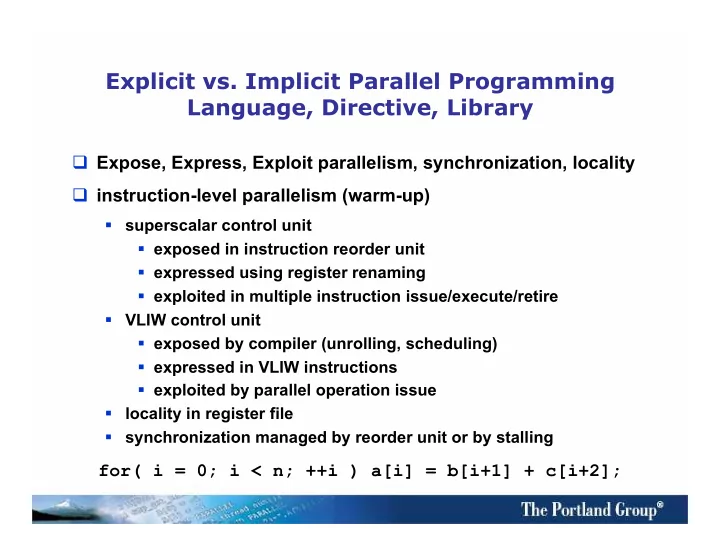

Explicit vs. Implicit Parallel Programming Language, Directive, Library Expose, Express, Exploit parallelism, synchronization, locality instruction-level parallelism (warm-up) superscalar control unit exposed in instruction reorder unit expressed using register renaming exploited in multiple instruction issue/execute/retire VLIW control unit exposed by compiler (unrolling, scheduling) expressed in VLIW instructions exploited by parallel operation issue locality in register file synchronization managed by reorder unit or by stalling for( i = 0; i < n; ++i ) a[i] = b[i+1] + c[i+2];
Explicit vs. Implicit Parallel Programming Language, Directive, Library Expose, Express, Exploit parallelism; synchronization, locality vector parallelism (warm-up 2) vector language extensions exposed by application programmer expressed in language extensions; remember Q8 functions? exploited by parallel/pipelined functional units a(1;n) = b(2;n) + c(3;n) vectorizing compilers exposed by application programmer (and compiler?) expressed in vectorizable loops exploited by parallel/pipelined functional units locality in vector register file, if available synchronization managed by hardware or compiler do i = 1,n ; a(i) = b(i+1) + c(i+2) ; enddo
Scalable Parallelism – Node Level MPI exposed in SPMD model static parallelism can decompose based on MPI rank expressed in single program (redundant execution) send/receive exposes locality exploited one MPI rank per core sync implicit with data transfer CAF (PGAS) exposed in SPMD model static parallelism can decompose, less general expressed using single program (redundant execution) get/put exposes locality one image per core sync, separate from data transfer HPF exposed in SPDD model static parallelism (data parallel only) expressed using single program load/store, locality hidden (implicitly executed redundantly) synchronization mostly implicit one HPF processor per core managed by compiler
Shared Memory Parallelism – Socket/Core Level Posix Threads exposed in application threads dynamic parallelism, SPMD or not can compose expressed using pthread_create() shared memory, coherent caches exploited one thread per core sync using spin wait, more calls Cilk exposed in asynchronous procedures dynamic parallelism can compose expressed using cilk_spawn shared memory, coherent caches pool of threads, work stealing spin wait sync, or barriers OpenMP expose in parallel loops, tasks static parallelism (mostly) does support dynamic tasking express with directives can compose, nested parallelism one OpenMP thread per core shared memory, coherent caches barriers, task wait, ordered regions
Accelerator Parallelism – GPUs, etc. no library equivalent CUDA or OpenCL exposed in kernel procedures static parallelism, does not compose expressed in CUDA kernels sync explicit within thread block kernel domain, launch sync implicit between kernels grid parallelism exposed memory hierarchy thread block parallelism host, device, sw cache, register accelerator asynchronous with host PGI Accelerator Model exposed in nested parallel loops static parallelism, data parallel only expressed in nested parallel loops, does not compose accelerator directives limited synchronization exploited as above locality managed by compiler
Abstraction Levels Library Node Level independent of compiler scalable, static parallelism opaque to compiler emphasis on locality Language Socket/Core Level allows optimization static+dynamic parallelism requires compiler locality unaddressed cache coherence Directives Accelerators allows optimization requires compiler regular parallelism may preserve portability locality exposed may allow specialization
Recommend
More recommend